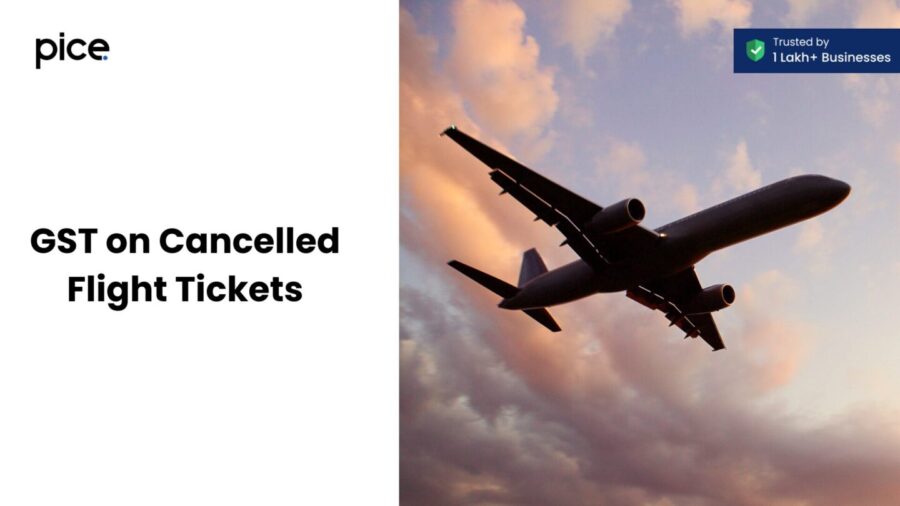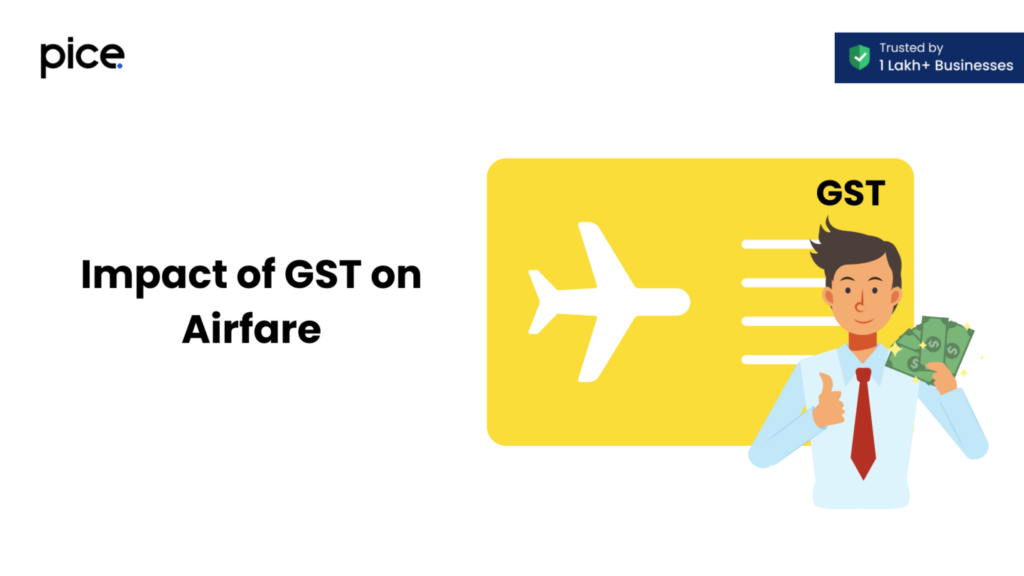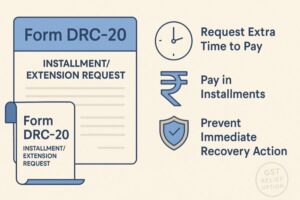GST on Cancelled Flight Tickets
- 29 Aug 24
- 11 mins

GST on Cancelled Flight Tickets
Key Takeaways
- GST on flight tickets varies based on travel class and type, with domestic economy at 5% and business class at 12%.
- International flight tickets are zero-rated under GST, though ancillary services are still taxable.
- Businesses can claim Input Tax Credit (ITC) on GST paid for flight tickets used for business travels.
- Proper documentation and GST-compliant invoices are essential for claiming ITC and ensuring compliance.
- GST is applicable on cancellation charges for both domestic and international flights, impacting overall costs.
Understanding GST on Flight Tickets
The Goods and Services Tax (GST) is a comprehensive, multi-stage tax levied on the supply of goods and services in India. When it comes to travel, particularly flight tickets, GST plays a significant role. Whether it's Business Class Tickets, Economy Class Flight Tickets, or International Flights, GST is applicable, impacting the overall cost of air travel.
For Business Travellers and Corporate Customers, understanding the nuances of GST on flight tickets is crucial. This knowledge helps Travel Managers and HR Departments manage travel budgets more effectively. The applicable Travel GST Rate on domestic flights typically stands at 5%, while International Airline tickets are taxed at a zero GST Rate. However, the situation becomes complex with Business Class Tickets, where the GST rate is 12%.
GST is not limited to the ticket price alone. The tax is also applicable to various components of air travel, including ancillary services provided by the airline, such as meals and seat selection. This means that GST is embedded in the entire Flight Ticket Booking process, from the Time of Booking to the actual flight.
For Domestic Airlines, the tax structure has simplified compliance, eliminating the previously prevalent cascading effect of taxes. Airlines, as Service Providers, can now claim Input Tax Credit (ITC) on the GST paid for goods and services used in their operations, such as aircraft fuel and maintenance services. This reduces the overall tax liability, potentially translating to cost savings for passengers.
Moreover, with the implementation of GST, the process of claiming refunds on cancelled tickets has been streamlined. Whether it's an Online Cancellation or a Cancellation at the airline's desk, the GST on Cancellation Charges is subject to the same rules as the original booking. This ensures a Seamless Refund Process, maintaining transparency for customers and service providers alike.
Impact of GST on Airfare

The introduction of GST has had a profound impact on airfare. For Business Entities, managing travel costs is a crucial aspect of operational efficiency. The shift from multiple taxes to a single GST has simplified the tax structure, impacting airfares significantly. However, the GST rates on flights vary based on the class of travel and the type of flight.
For Business Class Tickets, the GST rate is higher at 12%, affecting the overall cost of premium travel. This increase can be seen in both domestic and international sectors. On the other hand, Economy Class Tickets are subjected to a 5% GST rate for domestic travel, making it more affordable for the average traveler. This disparity in rates has led to a shift in customer preference, with many Corporate Travellers opting for economy class to save on travel expenses.
International Flights enjoy a zero GST rate, making international air travel relatively cheaper. However, ancillary services provided during international travel are taxed, adding to the overall cost. The zero GST rate on international flights has been a boon for frequent fliers and businesses with extensive international travel needs, as it helps in reducing the travel budget.
GST has also enabled airlines to streamline their operations by allowing the claiming of Input Tax Credit (ITC). Airlines can now offset the GST paid on operational expenses against the GST collected from passengers. This includes costs related to Hotel Bookings for crew, maintenance services, and other operational needs. The availability of ITC reduces the overall tax burden on airlines, potentially leading to lower airfares in the long run.
Despite the benefits, there are challenges. For instance, the GST on air travel has increased the administrative burden on airlines, requiring meticulous record-keeping and timely GST Invoices to claim ITC. This has led to an increased focus on technology and automation in the airline industry to manage GST compliance efficiently.
GST Input Tax Credit for Flight Tickets
One of the significant advantages of GST is the provision for Input Tax Credit (ITC). For businesses involved in extensive travel, understanding ITC on flight tickets is crucial. ITC allows businesses to claim credit for the GST paid on travel expenses, including flight tickets, thereby reducing the overall tax liability.
Travel Managers and finance departments within Business Entities must ensure proper documentation and GST Invoices for all travel-related expenses. This includes maintaining records of all flight bookings, whether for Business Class Tickets, Economy Class, or International Flights. Proper documentation is essential for claiming ITC and ensuring compliance with GST regulations.
💡If you want to pay your GST with Credit Card, then download Pice Business Payment App. Pice is the one stop app for all paying all your business expenses.
For example, when a company books flight tickets for employees traveling for business purposes, the GST paid on these tickets can be claimed as ITC. This applies to both domestic and international flights, provided the tickets are booked in the company’s name and the GSTIN (GST Identification Number) is mentioned on the invoice.
The process of claiming ITC involves a few steps. Firstly, businesses must ensure that the airline has charged GST correctly and issued a GST-compliant invoice. The invoice should include details such as the GST rate, the amount of GST charged, and the company’s GSTIN. Once the invoice is verified, the GST paid can be claimed as ITC in the business’s GST return.
It’s also important to note that ITC can only be claimed if the flight tickets are used for business purposes. Personal travel or travel for non-business-related activities does not qualify for ITC. Therefore, businesses must maintain clear records of the purpose of travel to support their ITC claims.
GST on International Flight Tickets
GST on International Flight Tickets operates differently compared to domestic flights. International air travel is generally zero-rated under GST, meaning that no GST is charged on the sale of international flight tickets. This zero-rating applies to both Economy Class and Business Class Tickets, making international travel more cost-effective for passengers and businesses.
However, while the ticket itself is zero-rated, ancillary services provided during international flights may still attract GST. For instance, services such as in-flight meals, seat selection, excess baggage, and other optional services offered by the airline are subject to GST. The applicable GST rate for these services typically ranges from 5% to 18%, depending on the nature of the service.
For businesses engaged in international travel, this zero-rating of international flight tickets is advantageous as it helps in managing travel budgets more efficiently. Companies can save on the GST that would otherwise be applicable on international airfares. Additionally, businesses can still claim Input Tax Credit (ITC) on the GST paid for ancillary services related to international travel, provided they maintain proper documentation and invoices.
Moreover, the zero-rated nature of international flight tickets simplifies the booking process for Corporate Travellers. Travel Managers and HR Departments can plan and book international travel without worrying about the additional GST cost on airfares. This encourages more businesses to expand their international operations and travel more frequently.
However, businesses must still be mindful of the GST implications on ancillary services and ensure that they claim ITC wherever applicable. Proper documentation and GST invoices are crucial for claiming ITC and ensuring compliance with GST regulations.
How to Calculate Tax on Airline Tickets
Calculating GST on airline tickets involves understanding the applicable GST rate and the various components of the airfare. The GST on Flight Ticket depends on factors such as the class of travel (Economy or Business Class), the type of flight (domestic or international), and any ancillary services availed by the passenger.
For Domestic Flights, the GST rate is 5% for Economy Class and 12% for Business Class. To calculate the GST, you need to multiply the base fare by the applicable GST rate. For instance, if the base fare of an Economy Class ticket is Rs. 10,000, the GST would be Rs. 500 (5% of Rs. 10,000), making the total fare Rs. 10,500.
For International Flights, the ticket itself is zero-rated, meaning no GST is charged on the base fare. However, if the passenger avails of ancillary services such as in-flight meals or extra baggage, these services are subject to GST. The applicable GST rate for ancillary services varies, typically ranging from 5% to 18%.
It is important for Travel Managers and businesses to understand these calculations to manage travel budgets effectively. By knowing the GST implications, businesses can better forecast travel expenses and ensure compliance with GST regulations.
Additionally, businesses should maintain proper documentation and GST invoices for all travel-related expenses. This ensures that they can claim Input Tax Credit (ITC) on the GST paid, reducing their overall tax liability.
GST on Air Ticket Cancellation Charges
GST is also applicable on the Cancellation Charges for air tickets. Whether it is a Domestic Cancellation or an International Cancellation, airlines charge a cancellation fee which is subject to GST. The applicable GST rate for cancellation charges is the same as that for the original booking.
Domestic Cancellation Charges
For domestic flights, the GST rate on cancellation charges is 5% for Economy Class and 12% for Business Class. For instance, if a Business Class ticket costing Rs. 20,000 is canceled, and the cancellation fee is Rs. 2,000, the GST on the cancellation fee would be Rs. 240 (12% of Rs. 2,000). This amount is added to the cancellation fee, making the total payable amount Rs. 2,240.
This GST on cancellation charges applies to all forms of cancellations, whether they are initiated Online Cancellation or through other modes. Airlines must ensure that they provide GST-compliant invoices for cancellation charges, detailing the GST amount separately.
For businesses, managing cancellations and understanding the GST implications is crucial. Proper documentation of cancellation charges and GST invoices helps in claiming Input Tax Credit (ITC) on the GST paid for cancellations. This can be particularly beneficial for businesses that frequently book and cancel flights due to dynamic travel schedules.
International Cancellation Charges
For international flights, the scenario is slightly different. Although the ticket itself is zero-rated under GST, cancellation charges are still subject to GST. The applicable GST rate for international flight cancellation charges generally aligns with the rates for domestic flights – 5% for Economy Class and 12% for Business Class.
For example, if an international Business Class ticket costing Rs. 50,000 is canceled with a cancellation fee of Rs. 5,000, the GST on the cancellation fee would be Rs. 600 (12% of Rs. 5,000). This GST amount is added to the cancellation fee, making the total payable amount Rs. 5,600.
Similar to domestic cancellations, airlines must provide GST-compliant invoices for international cancellation charges. This ensures transparency and allows businesses to claim ITC on the GST paid. Maintaining proper records and documentation is essential for businesses to manage their travel budgets effectively and ensure compliance with GST regulations.
In conclusion, understanding the implications of GST on flight tickets, whether it’s for domestic or international travel, is essential for both individual travelers and businesses. The GST framework simplifies the tax structure but requires meticulous documentation and compliance. By leveraging the benefits of Input Tax Credit and understanding the GST rates, businesses can manage their travel expenses efficiently and ensure seamless travel operations.
 By
By 
















